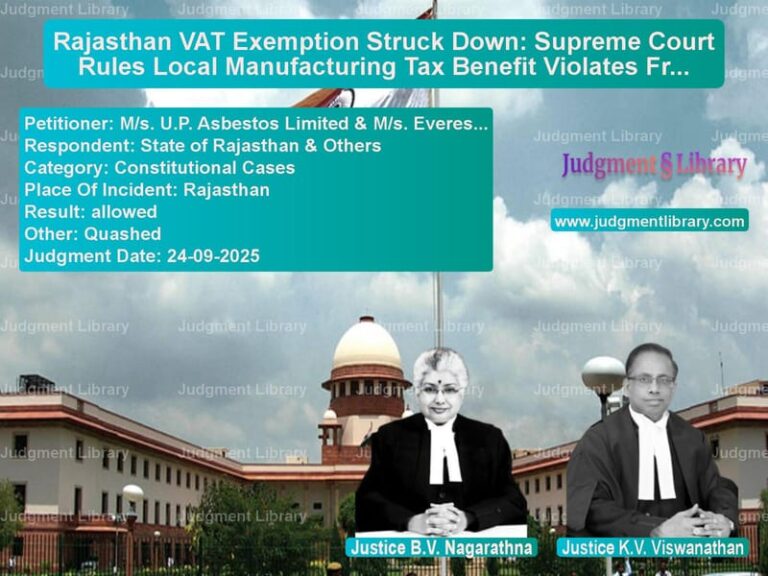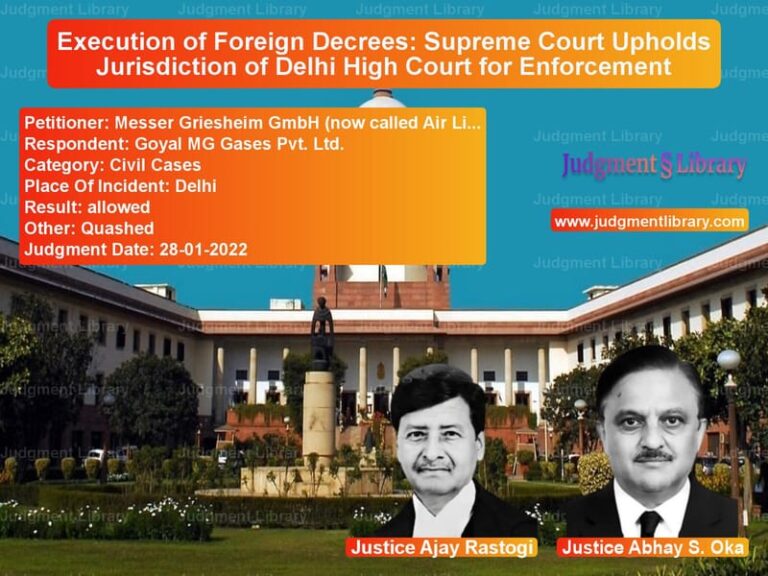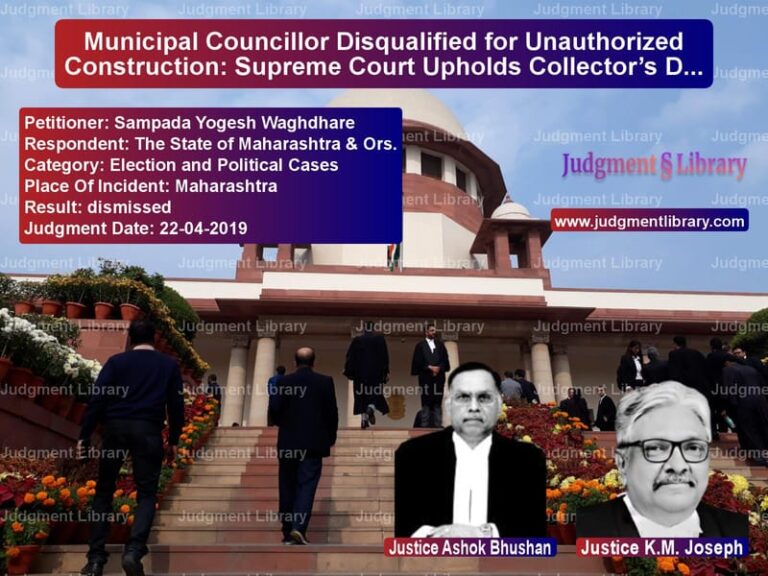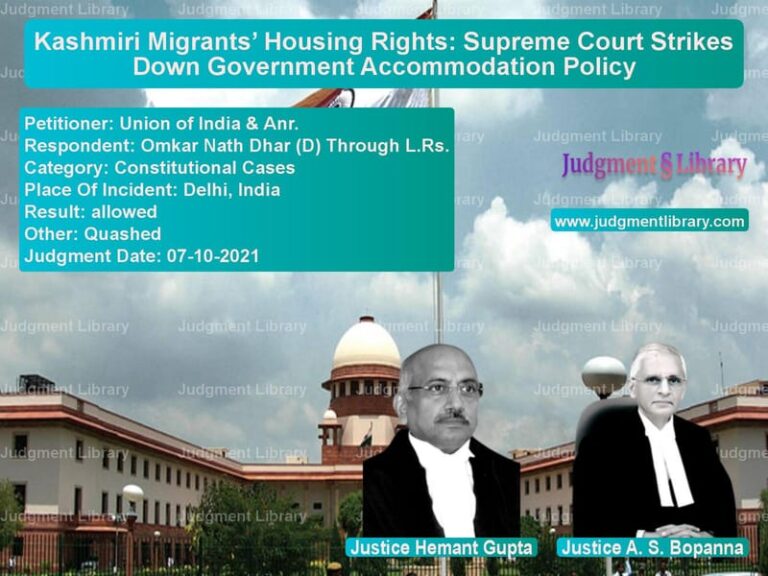Supreme Court Allows Recall of Witnesses in Tamil Nadu Corruption Case
The case of The State Represented by the Deputy Superintendent of Police vs. Tr. N. Seenivasagan revolves around a corruption charge under the Prevention of Corruption Act, 1988. The Supreme Court had to decide whether the prosecution should be allowed to recall witnesses under Section 311 of the Code of Criminal Procedure (CrPC) to mark crucial evidence in an ongoing trial.
Background of the Case
The case originated from an FIR registered on July 13, 2010, against the respondent, N. Seenivasagan, who was a Chief Engineer at the Tamil Nadu Generation and Distribution Company Limited (TANGEDCO). He was accused of demanding a bribe for revoking the suspension of an employee.
The Chairman-cum-Managing Director of TANGEDCO granted sanction for prosecution on June 28, 2011. The investigation led to a chargesheet being filed under Sections 7, 12, and 13(2) read with Section 13(1)(d) of the Prevention of Corruption Act, 1988.
During the trial, the prosecution presented 12 witnesses and marked key evidence, including the sanction order dated June 28, 2011 (Exhibit P-1). However, after the completion of evidence and final arguments, the prosecution sought to recall PW-1 (Chairman of TANGEDCO) and PW-11 (Deputy Superintendent of Police) to formally introduce the Board’s approval document for prosecution, which had not been marked earlier.
Trial Court and High Court Proceedings
The prosecution’s application under Section 311 CrPC to recall the witnesses was rejected by the trial court on February 19, 2019. The prosecution then approached the Madras High Court under Section 482 CrPC, but the High Court dismissed the plea on June 24, 2019, stating that the request was made too late in the trial.
Key Issues Before the Supreme Court
- Whether the prosecution could recall witnesses at the final stage of the trial under Section 311 CrPC.
- Whether introducing additional evidence was essential for the just decision of the case.
- Whether the High Court erred in dismissing the prosecution’s request.
Arguments by the Prosecution
The prosecution contended:
- The Board’s approval document was critical to proving that the prosecution sanction was valid.
- The delay in submitting the request was due to administrative reasons, including the transfer of the Special Public Prosecutor.
- Section 311 CrPC allows recalling witnesses “if their evidence appears to be essential to the just decision of the case.”
Arguments by the Respondent (N. Seenivasagan)
The respondent opposed the recall of witnesses, arguing:
- The prosecution had ample opportunity earlier to mark the document and was now trying to fill gaps in its case.
- The Board’s document was unsigned and lacked legal authenticity.
- The Chairman of TANGEDCO (PW-1) had already testified that he granted sanction without Board approval, making further evidence unnecessary.
Supreme Court’s Analysis
1. Applicability of Section 311 CrPC
The Court emphasized the importance of Section 311 CrPC, stating:
- “The discretionary powers under Section 311 CrPC are meant to ensure that all necessary and material evidence is brought before the court.”
- “An application under Section 311 cannot be rejected merely because the trial has been pending for a long period.”
2. Importance of the Document
The Supreme Court found that the approval document was critical to determining whether the prosecution sanction was properly granted. The Court noted:
- “The prosecution should not be denied an opportunity to introduce a crucial document merely because of procedural delays.”
- “Ensuring a fair trial requires that all relevant evidence is presented, subject to cross-examination by the defense.”
3. No Prejudice to the Defense
The Court ruled that allowing the recall of witnesses would not unfairly prejudice the defense. It held:
- “The defense will have full opportunity to cross-examine the witnesses on the newly introduced document.”
- “The objective is not to reopen the entire trial but to ensure the decision is based on complete evidence.”
Final Judgment
The Supreme Court allowed the appeals and set aside the High Court’s order. It ruled:
- The applications to recall PW-1 and PW-11 were granted.
- The trial court must allow the prosecution to introduce the document and conduct cross-examinations.
- The trial should be completed by July 31, 2021, to prevent undue delay.
Implications of the Judgment
This ruling has significant implications for criminal trials:
- It reinforces the wide discretion courts have under Section 311 CrPC to ensure a fair trial.
- It affirms that key evidence should not be excluded due to procedural delays.
- It upholds the principle that recalling witnesses should be allowed if it serves the interests of justice.
The Supreme Court’s decision ensures that technicalities do not obstruct the fair prosecution of corruption cases.
Petitioner Name: The State Represented by the Deputy Superintendent of Police.Respondent Name: Tr. N. Seenivasagan.Judgment By: Justice D.Y. Chandrachud, Justice M.R. Shah.Place Of Incident: Tamil Nadu.Judgment Date: 01-03-2021.
Don’t miss out on the full details! Download the complete judgment in PDF format below and gain valuable insights instantly!
Download Judgment: the-state-represente-vs-tr.-n.-seenivasagan-supreme-court-of-india-judgment-dated-01-03-2021.pdf
Directly Download Judgment: Directly download this Judgment
See all petitions in Fraud and Forgery
See all petitions in Bail and Anticipatory Bail
See all petitions in Judgment by Dhananjaya Y Chandrachud
See all petitions in Judgment by Mukeshkumar Rasikbhai Shah
See all petitions in allowed
See all petitions in Remanded
See all petitions in supreme court of India judgments March 2021
See all petitions in 2021 judgments
See all posts in Criminal Cases Category
See all allowed petitions in Criminal Cases Category
See all Dismissed petitions in Criminal Cases Category
See all partially allowed petitions in Criminal Cases Category







